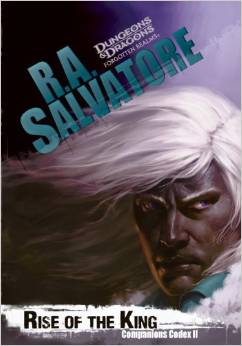|
|
|
|
|
|
|
|
|
|
|
|||
| Pojo's Gamer's Friday News! | |||||
|
|
|||||
 |
|||||
|
|
|||||

|
|
"Rise of the King" by R.A. Salvatore Rise of the King
exists in interesting times. In the original saying,
“interesting times” were a bad thing, or at least a
difficult thing.
In the Companions Saga, the
franchise seems to set out its choice. The series is a
multi-part story set in D&D’s greatest world – in addition
to Drizzt and friends, Faerun gave us the genre-defining
CRPGs Baldur’s Gate and Icewind Dale. The
series marks the return of Drizzt and his companions – not
everyone is a fan of the drow ranger, but everyone knows who
he is, whether they revere him or parody him. Faerun’s
future is, it seems, very much connected to its past, and it
shows in Rise of the King, from the explicit
references to 3rd and 4th Edition
Realms lore down to the divine intervention trick used to
restore Drizzt and his friends to life in the current era. This choice is notable, and is
far from a given. Even the other arm of Wizards of the Coast
seems intent on making Magic: the Gathering more and more
divergent from its own history and the experience of its
long-time fans. It is a deliberate choice, and it is also a
statement. They are staking out an argument that while the
edition number has changed, and the game mechanics have
changed, this is still the Dungeons and Dragons of legend,
and is still capable of telling the stories that a past
cohort of roleplaying gamers fell in love with. And judging by Rise of the
King, that statement is true. If this is your first Companions
novel – much less your first Forgotten Realms novel – you’ll
find the story very much in motion starting from the first
page, and you may not see the significance of all the
characters and points. And there are a lot. In general,
though, the story is drawn in sufficient detail that you
will catch on soon. Besides, as befits a middle volume,
Rise of the King sweeps readers into the action. The
book soon introduces at least two characters to whom the
title might apply, though only one can prevail. Armies
march, magic surges, and cities burn almost from the word
go. To longtime Faerun players, a lot of this may seem like
things they have seen before. Still, there are some
surprising twists and revelations, especially when it comes
to the drow factions’ convoluted politics; and Salvatore
goes out of his way to illustrate explicit conflicts between
good-aligned individuals and groups, a feature that has not
always been emphasized in the lore of the Realms (or other
role-playing games, but that’s a point for another time). If you didn’t approve of the
edition-related changes to Faerun, this book probably won’t
change your mind. If you think Drizzt is a dyed-in-the-wool
Mary Sue, you probably won’t be swayed from that view. But
Rise of the King might just remind you of what has
made Faerun such an amazing setting for all these years: the
high-stakes conflicts, high-speed action, and likable
characters are as you remembered them. Salvatore is to be
commended for avoiding a dramatic tonal shift in the post-Spellplague
stories, a choice that makes Faerun stand out for a
different reason, among other settings that attempt to be
gritty, depressing, and jarringly realistic. Some RPGs were designed to
resolve mechanical and structural issues identified by their
designers. Others were designed to promote a certain vision
of roleplaying as a practice, and certain styles of
storytelling. But in the end, an RPG and its tie-ins must be
judged on the simplest of questions: is this a world the
players and readers care about? A world they wish to be a
part of, to play a role in? If Rise of the King is a
snapshot of Faerun as it is now, then the Realms have plenty
to offer. Some things may have changed, but Drizzt and
friends have lost none of their power to compel your
attention, keep you turning the page, and let you into the
world of Faerun with all its wonders, threats, and magic.
May certain things never change.
|
|
|
|
|
Copyrightę 1998-2014 pojo.com
This site is not sponsored, endorsed, or otherwise affiliated with any of the companies or products featured on this site. This is not an Official Site. |
|||||
 The world has changed in the many years
since Drizzt made his debut – both his world of Faerun, and
the world of roleplaying games. The Forgotten Realms have
been racked by social, political, and cosmic upheaval, not
all of which went over very well with the fans. Once, a
Dungeons and Dragons novel like Rise would have been
the only game in town. But now, the fanbase has split (you
might say there has been a Sundering), and we bore
witness to the rise of Pathfinder with its bizarre mashup of
pulp fantasy tropes, and Tumblr-active writers. Dungeons and
Dragons continues, but you’d be forgiven for wondering what
its course in such interesting times must be.
The world has changed in the many years
since Drizzt made his debut – both his world of Faerun, and
the world of roleplaying games. The Forgotten Realms have
been racked by social, political, and cosmic upheaval, not
all of which went over very well with the fans. Once, a
Dungeons and Dragons novel like Rise would have been
the only game in town. But now, the fanbase has split (you
might say there has been a Sundering), and we bore
witness to the rise of Pathfinder with its bizarre mashup of
pulp fantasy tropes, and Tumblr-active writers. Dungeons and
Dragons continues, but you’d be forgiven for wondering what
its course in such interesting times must be.